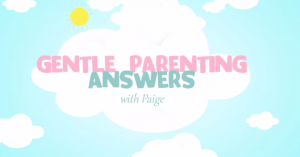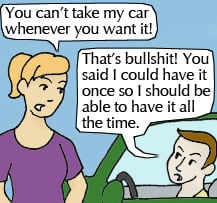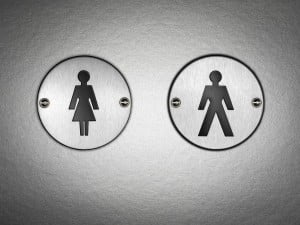
Source: Jamelle Bouie
I wish I could say that the violence at Donald Trump rallies surprises me, but it doesn’t. For example, if you consider the people that we worship as “heroes” in our culture, these destructive actions were bound to happen.
Our culture has an unhealthy fixation with the “antihero” character that is commonly seen in television and movies, someone who lacks conventional heroic qualities and occasionally commits heinous acts.
I believe that the creation of antiheroes was in response to the cookie-cutter way heroes were portrayed in typical “good guy vs. bad guy” fashion. This black-and-white way of storytelling became trite over time, so antiheroes were a welcome change.
Finally, we were able to color with shades of grey, which is a more accurate portrayal of reality. Finally, we could see bits of human vulnerability in our heroes and bits of ourselves as heroic.
However, what started as a noble new attempt at storytelling developed into antiheroes becoming increasingly villainous over time.
Instead of a protagonist who was flawed, we started following protagonists who were cold-hearted, frivolous murderers and gleefully cheered them on.
The Tony Soprano character, for example, is an arrogant serial killer, and even when The Sopranos represents him as a despicable human being, large portions of people were rooting for him. People wanted to identify with a person who doesn’t care about anybody else.
It feels powerful and liberating to feel like you can do whatever you want to whomever you want without consequences — even though this is a fantasy because there are always negative consequences when you hurt others.
So identifying with someone who can be perceived as “rebellious” was a prospect that was too alluring for many people to reject morally.
Then it started escalating, and people began cheering for the likes of Patrick Bateman, from American Psycho, who kills women with chainsaws and murders animals for fun.
And most recently, the Frank Underwood character from House of Cards offers almost no redeeming qualities. His Machiavellian philosophy pushes him to seek power by any means necessary, and instead of his character being perceived as a cautionary tale, t-shirts are printed in his name glorifying his behavior.
I find there’s little difference between cheering for these characters and cheering for Donald Trump.
Even though many people can tell the difference between reality and fiction, so much of our lives are dominated by technology that we view people from behind a TV or computer screen. Differentiating what’s real and fake becomes increasingly difficult.
And I believe these fictional characters get cheered because many people feel powerless. But instead of addressing this powerlessness internally, or directing their anger towards corrupt social, economic, and political systems, they would rather cheer for people who do things they consider to be rebellious. And quite honestly, sometimes the prospect of committing destructive behavior to regain some semblance of power can be really enticing.
In the process, however, our constant rooting for fictional people who commit harmful acts diminishes our capacity for empathy when it comes to real-life people. Here are some reasons how.
1. It Blurs the Lines Between Reality and Fiction
Since there are so many television shows that feature protagonists who have antihero tendencies (The Sopranos, The Walking Dead, House of Cards, etc.), we grow accustomed to seeing casually callous behavior from people we look up to. As a result, when someone commits a crime on the news, our reactions from fiction and reality slowly become one and the same.
For instance, there was a strange sadistic fascination when a man filmed himself shooting two news anchors live on the air and then posted the footage on Facebook. While many people were rightfully disturbed by this act, millions of people still watched and shared the video.
Even though many people condemned his actions, passing around that horrific video just shows that this actual crime wasn’t treated with true horror as it should’ve been. It was treated like riveting television.
I’m not saying that watching fictional characters perform horrible actions causes violence; I’m saying that watching horrible actions being committed by people we portray as heroes normalizes violent behavior.
To make matters worse, there are studies that demonstrate how our brains cannot distinguish between real events and fiction. Given how realistic violence has gotten on television and movies, an image of a bloodied man on the floor of a Trump rally is met — by a large portion of the population — with apathy. Even worse, it’s also met with anger, not that he was beaten, but that he brought it on himself because we’re used to rooting for perpetrators of violence rather than the victims.
Trump’s ascent to power, for example, feels like a reality TV show, and since reality TV is on the same networks as fictional programming, it almost doesn’t seem real that he’s a leading presidential candidate. I believe this is why so many people make jokes about how funny and entertaining it would be for him to actually win the presidency.
To our culture, what is considered “funny” and “entertaining” supersedes all other importance, because the actual harm done to human life is not seriously taken into consideration. If killed or assaulted, we become collateral damage for other people’s amusement.
But there are real people who are getting harmed and murdered. Not everything is a television show. Not everything is consumption for entertainment.
There’s nothing wrong with occasionally enjoying programming that contains violence and even characters that commit crimes, but our constant obsession with portraying them as heroes only fans the flames that perpetuate more bloodshed and brutality.
2. It Gives People the Impression That Real-Life Heroes Should Act Like Fictional Antiheroes
One thing many antiheroes have in common is their propensity for obtaining power through aggression. They’ll assert themselves in situations and lead authoritatively, and many people gravitate towards them because it’s empowering to rally behind people who seem like they’re no-nonsense and don’t stand for any type of insubordination.
While assertiveness is a desirable quality in leadership, we’ve gone from assertiveness to domineering. It is deeply disturbing, for instance, how many people find Frank Underwood’s character to be aspirational.
For those that don’t watch House of Cards, he is a ruthless politician guilty of heinous crimes, but since he is so dominating to his opponents, he is perceived as ruthless renegade. He is perceived as “cool.”
It’s this same mentality that makes Donald Trump so popular, because he is perceived by many as a ruthless figure who wants to torture suspects for information and has called for his supporters to punch protesters.
Fittingly, Donald Trump also holds this mentality which explains his predilection towards Vladimir Putin. It has nothing to do with Putin’s actual politics; it’s that he bullies other people to continually seize power, and that’s a quality that Donald Trump can appreciate and relate to.
Heroes on TV and movies don’t necessarily need to be one-dimensional goody-two-shoes, but it’s possible for protagonists to be strong and interesting characters without glorifying toxic behavior.
Jessica Jones, the protagonist of the Netflix television series with the same name, is an example of a flawed hero who doesn’t fall under the frivolously callous category nor does she fall under the prudish category. Even though she has personality flaws, she doesn’t bask in having to commit violence.
In fact, whenever she realizes that she may have to kill someone, or whenever she sees someone else getting killed, it disturbs her deeply. It isn’t “cool” that she has to inflict harm on others.
There are other characters on television that hold these qualities as well, such as Molly and Lou Solverson on the first and second seasons of Fargo respectively. Both of these characters are genuinely good people who want to do the right thing, and they aren’t boring cookie-cutter characters. Unfortunately, examples of these types of characters are few and far between.
Otherwise, television and movies are dominated by characters who relish in destruction.
And oftentimes when I speak out about these characters, I’m categorically dismissed as somebody who is an oversensitive wuss who can’t handle the harsh realities of the world.
This mentality carries over when discussing real-life politics. When a politician is overly aggressive, huge segments of people will applaud their brashness instead of realizing that over-aggressiveness creates more enemies and long-term problems.
It is possible — such as with the aforementioned examples that I’ve given — to have interesting compelling protagonist heroes who struggle internally with doing the right thing. They don’t always have to be rebellious contemptible people who don’t care for others.
I hope that the portrayal of protagonists begins shifting to a different paradigm, because the more images we see of protagonists acting like kindhearted yet complex individuals, the more likely we’ll accept these types of people as heroes in real-life.
3. People Who Try to Stop the Antihero Are Portrayed as the Villains
In Breaking Bad, a television program about a chemistry teacher who becomes a drug kingpin, the protagonist’s wife, Skyler White, was on the receiving end of so much vitriol from the show’s fans.
What was her grave crime? Constantly questioning her husband’s, Walter White’s, suspicious behavior. She was also criticized later on for insisting that he leave the life of crime because he’s putting their family in grave danger.
Throughout the series, Skyler White is meant to be portrayed as a sympathetic character. She is constantly lied to and condescended to; she’s the victim of mental abuse; she has to shield her son from her husband’s destructive behavior; she has to live knowing that there have been murderers and drug dealers staking out their house.
But instead of being viewed as sympathetic, many of the show’s fans hated her passionately because she was getting in the way of watching antihero Walter White continually seize power.
This show is a perfect example of a program that tries to portray the protagonist in the most evil light that it possibly can. Even the creator of the series, Vince Gilligan, has admitted that Walter White is supposed to be the villain of the series. But in the end, too many people cheered for Walt. He was the hero no matter how heinous his actions were.
I believe this is indicative of our society’s diminished capacity for empathy.
The only way people could really cheer for Walt’s behaviors is if they don’t care about what happens to any of his victims.
A person who is supposed to be villainous will not be perceived as evil if the audience relishes in their behavior.
Consequently, the only people who are perceived as villains are the ones who are trying to stop the destructive behavior from continuing. Sadly, not only are they victims, but they are seen as antagonists.
It should come as no surprise that how we speak about victims is so reminiscent with the way people speak about Skyler White. The continued escalation of cheering on toxic behavior has made it that we take the bully’s side because we view them as strong while we view victims as oversensitive killjoys.
If somebody gets hurt protesting injustices, many will say they had it coming because they shouldn’t have been there.
When somebody laments about living in poverty, many people will say that they deserve to be suffering because they didn’t work hard enough to get out of their situations.
When someone is sexually assaulted, more people are concerned with what the victim wore rather than who committed the heinous crime.
When a 15-year-old girl is pepper sprayed at a Trump rally, some people actually cheer it on.
These television shows may not have created these problems, but they certainly shed a light on how everyday people react to brutality. In many cases, people’s reactions are uncaring because they have no empathy for others who get hurt.
4. It Makes Some People Strive to be Frivolously Violent and Callous
Some people emulate the protagonists they see on television because they symbolize people that we can look up to. Naturally, some qualities of an antihero become aspirational, such as not thinking or caring about what happens to others.
The message that some people take away from these characters is that caring is for wusses. Only weak people care.
Trump personifies this mentality by how callously he treats people at his rallies. He encourages violence against protestors and heartlessly throws them out into the cold.
Many of his supporters admire his viciousness.
Although there is some value in maintaining one’s composure in the face of adversity, rarely are emotions seen with that level of nuance. It’s more common that viciously uncaring people like Trump are viewed as “cooler” because they are portrayed as more strong-willed than those weak people who dare show that they care about anything.
In reality, only 1-3% of people are born sociopathic — which is an actual psychological disorder and not something to scapegoat callous violence into, so television’s glorification of the unemotional genius, such as Sherlock Holmes, doesn’t exist in real-life. Everyone else who claims to “not care” is simply trying to escape feeling accountable to other people.
Ironically, their detachment actually shows how fragile they are because they are so afraid of getting emotionally hurt that they try to shut off their emotions as a defense mechanism.
When someone tries so hard to “not care,” what they are really saying — perhaps without realizing it — is that they wish to no longer have empathy and care for others because it’s too hard and it hurts too much.
What they would like to happen is to become unfeeling and beat the empathy out of themselves.
Lacking empathy shouldn’t be something to aspire to. Not only is it destructive, but it is counterproductive in terms of wanting to be a stronger person. Purposely trying to not feel for others is a cowardly way of living life because it takes away so much risk of being a human.
When you care for someone else, it means that you might eventually learn to love or trust them; it also means that you make yourself vulnerable to potentially getting hurt.
Rarely is it perceived as heroic to take an emotional risk and show vulnerability to someone else. But it really is, because caring about others deeply is one of the bravest and most heroic things you can do.
***
When we look at all the factors, Trump’s recent successes are wholly unsurprising. Unfortunately, neither is the violence perpetuated by some of his supporters.
I believe that, over time, we can shift public perception and make people realize that having empathy for others is beneficial for everyone in society.
We can show people that kindhearted protagonists can be interesting characters to look up to, while violent characters who lack empathy and compassion are cautionary tales rather than aspirational.
Hopefully in the future, when a Trump-like figure rears their ugly head trying to obtain power, we will nip it in the bud before it gets out of control. We’ll come together collectively and unanimously say that we don’t condone the kind of hatred they’re spewing.
We’ll see these characteristics and behaviors for what they are: destructive tendencies that have no place in our society.
[do_widget id=’text-101′]
Robin Tran is a Contributing Writer for Everyday Feminism. She is a standup comedian and blogger, and she holds a BA in English from UC Irvine. In early 2015, Robin came out as transgender woman and has written about her firsthand experiences ever since. She has performed at the Improv, Mad House Comedy Club, and the Comedy Palace, and her articles have been published in xoJane and Time.com.
Search our 3000+ articles!
Read our articles about:
Our online racial justice training
Used by hundreds of universities, non-profits, and businesses.
Click to learn more
Most Read Articles
- « Previous
- 1
- …
- 30
- 31
- 32



















